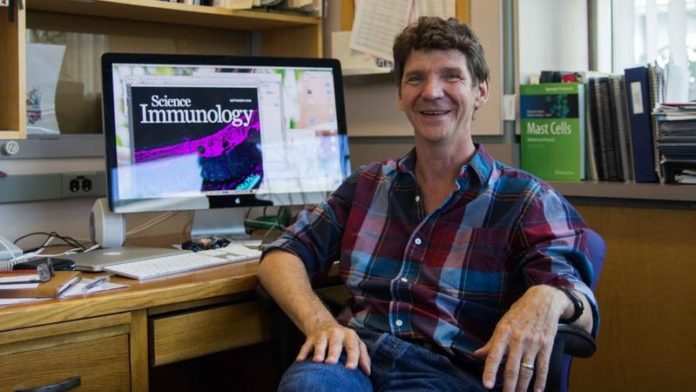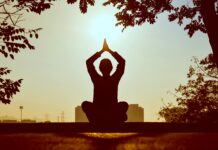Kelly Marshall McNagny is a Professor of Medical Genetics at the School of Biomedical Engineering at the University of British Columbia. His research focuses on a protein called CD34 as a therapeutic target for allergic inflammation and asthma. We asked him everything from the essential value of mentorship to his affinity for Peruvian cuisine in hopes of giving you a better understanding of what goes on outside the lab for one of the best minds in Canadian research.
What do you like most about being a researcher?
There is nothing like the chance to discover something new daily. We know so little about how biology really works that, as my thesis advisor put it, “it’s like a crumb in the corner of a room”. Particularly because of the new tools we have, every day offers a new opportunity for discovery. If you’re a fan of puzzle-solving, this career is a dream come true. Without even trying, you continually trip over new discoveries. With a little more focus you can do much better than that!
What advice would you give young researchers?
Probably the most valuable advice I could give (and I’ve either learned this through intuition or dumb luck) is that the most important choice you will make throughout your career is who you choose to work with as your immediate supervisor/mentor. A good mentor is crucial at every stage; it’s true of your thesis supervisor, your PDF advisor, and your first department or institution head.
Choose someone inspiring and whom you know, on a gut level, you will love working with, day and night. The reality is that you will spend uncounted hours with these people, and they literally hold your career in their hands. If you like them and have a good personal relationship with them, then you will learn all the essential skills and it will never feel like work. You’ll put in the hours, you’ll learn, and you’ll be a success. If you don’t, you’ll fail.
Furthermore, there will always come a time in your career when you simply run out of money, time, or options and need a helping hand to bridge the hard times; I don’t care who you are. If you have a mentor with whom you have a gut-level strong friendship, they will help you through those rough patches. Longevity is key in this business, and these are the individuals who will provide you with that longevity.
To this day, I adore my thesis supervisor, PDF advisor, and first department head; I’m a composite of their mentorship, and I thank my lucky stars I chose wisely.
What inspired you to become a researcher?
Two reasons. Firstly, I am uncontrollably curious. I was always the kid who would walk up a creek for hours and hours if I knew there was an undiscovered part I hadn’t yet explored ahead (got me into trouble constantly with my parents); it’s just in my DNA. I couldn’t possibly be happy with a routine job where I knew what was around the corner every day. Took me a long time to learn that in university, but once I did, my path was set.
Once I knew this, the next element was having incredibly inspiring mentors who served as role models for me. “You mean I can make a career out of curiosity? And I can work all over the planet with smart people everywhere I go? Seriously? Sign me up!”
What do you like to do for fun?
I love playing the guitar (badly!) with my scientist friends who are all stellar scientists but also closet musicians. There’s never a dull moment. I’ve been in bands ever since I screwed up the courage to form one with a bunch of postdocs at EMBL (Major Groove and the Sticky Ends). What we lacked in talent, we made up for in passion.
I also love hiking and getting out in nature. I’m a country boy at heart and love being able to get outside every day, even if it’s just for a little while. That also goes for travelling. One of the perks of science is being able to travel to some truly spectacular places and see the world. So little time, and so many places to see.
What’s your favourite cuisine?
Easy, Peruvian! I’m lucky to have a Peruvian spouse (who is likely a better scientist than I am!), and she introduced me to Peruvian cuisine. It is unparalleled! Peru is blessed with an amazing diversity in climate within a fairly small space: amazing seafood and spices from the coast, crops cultured at high-altitude in the Sacred Valley in the Andes by the Inca, and tropical fruits and spices from the Amazon. Now, throw in a melting pot of cultures: Indigenous, Hispanic, Japanese, Chinese, and African, and you have an equation for the best food and mixtures in the world. Try it!
Also, if you do nothing else in your life, go once to Peru! Eat, enjoy the music, and enjoy the wonderful people.
If you could do any profession other than your own what would it be?
Also easy. Historian or archaeologist. I’m a history fanatic; I’m fascinated by how cultures evolved and what tipped them in one direction or another.
If you could meet any historical figure, who would it be and why?
Oh, that’s much tougher! Really too many figures to choose from. Someone ancient for sure.
I’d probably say one of the pre-Inca or Inca priests who preserved the oral history of their culture in pre-Columbian times.
Because of the rapid downfall of the North and South American cultures after European contact, so much history and culture were lost. Just imagine, disease likely wiped out 50–80% of the peoples of the Americas within the first few years of contact, and much of what remained was erased during the conquests. These cultures had completely different poetry, culture, art, language history, myths, views of life, success, and morality.
What we have left are just fragments. Imagine what would be left of European culture if, overnight, 90% of the people disappeared. It would lead to a complete collapse of infrastructure and a complete loss of much of what we find so inspiring today. Can you imagine Europe with no Renaissance?
I would love to know just a fraction of what was lost of pre-Columbian culture. Sign me up for a trip back in time.











































